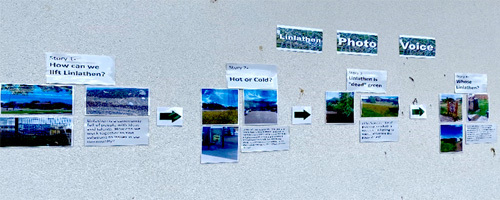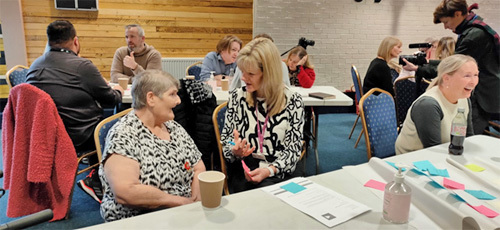An asset-based approach to tackling poverty and inequalities in Dundee
Dundee City Council (DCC) has a well embedded culture of working in partnership with community groups and representatives, both at a locality and strategic level. The focus of this partnership work has always been on the reduction of inequalities across the city.
Senior leaders recognise and value the contributions made by communities to tackle issues locally. They also recognise the role of Community Learning and Development (CLD) in supporting communities to take action, express their voice, and participate at strategic level. Dundee Partnership, the Community Planning Partnership (CPP), is committed to a locality approach to deliver on their Local Outcome Improvement Plan (LOIP), with communities as partners.
Dundee has a local CPP in each ward, which is made up of statutory, community and third sector representatives. These local CPPs are co-ordinated by a CLD staff team. Each local CPP has a 5-year Local Community Plan, which sets out what will happen in each ward to help reduce inequality across the timespan of the plan. These plans are based on community need. These needs were identified from community consultation and engagement, which was supported by data sources, such as Social Index of Multiple Deprivation (SIMD). CLD staff support several thematic sub-groups that sit below the local CPPs.
The CLD staff also provide development support to several independent community groups who are also contributing towards a reduction in inequalities in their own communities.
Examples of the work with communities that support the reduction in inequalities, includes the Local Fairness Initiative in Linlathen.
The improvement issue
Data shows that there are areas of Dundee that experience inequality and disadvantage. These areas have not seen improvements for several years. This includes Linlathen, which is one of the 10 most deprived communities in Scotland. There was less community activity in Linlathen than in other parts of the city and less services and amenities available locally.
Linlathen is one of 4 communities that make up the East End ward, which is served by the East End Local CPP. Linlathen has a population of around 1,871. Previously, a whole ward approach to tackling inequality would have been used. However, the East End CPP decided to test out prioritising resources that focused on a smaller area with the poorest outcomes. This would help determine if partnership interventions produced improved results, and if the community would recognise positive change.
The overarching objective of the initiative is to lift people out of poverty by improving financial resilience, and addressing impacts associated with poverty. This includes poor health and wellbeing, social isolation, and fuel and food insecurity. The long term aims of the project is that a Fairness Initiative would be established in Linlathen and residents would have:
- increased income from employment
- improved mental wellbeing
- reduced their costs of living
- increased income from social security benefits and any in kind benefits.
What Dundee City Council did
A steering group of local partners, coordinated by CLD, was established and has worked collaboratively towards achieving shared outcomes. Innovation, collaboration and partnership working are driving forward the initiative locally. This includes shared training opportunities and partnership development sessions.
Data was gathered from a range of sources to produce a locality profile for Linlathen, including:
- SIMD reports for Linlathen’s for 2 datazones
- NHS data on mental health and substance use
- DCC data on positive destinations for young people
- Citizen Advice Bureau data on enquiries about benefits and other areas of concern
The locality profile, informed by date, helped support strategic leads and local partners to develop a deeper understanding of the issues in Linlathen. This encouraged partners’ participation in a Fairness Initiative.
However, it was recognised that the voice of the community members was missing. CLD staff and an academic partner developed a narrative inquiry approach. This approach was used to establish what the people of Linlathen thought the key issues were, and what would make the biggest difference to their lives.
Over 80 residents and 70 partners and stakeholders were involved in narrative inquiry, including 15 more in-depth interviews. Community members, CLD staff and other public and third sector partners were trained in film making. Short films were created, which helped to highlight the issues and available opportunities in the community.
These films were shown to strategic leads, local CPPs, including local councillors and other community members to generate more support and discussion. These findings helped inform the agreed priorities for the Linlathen Fairness Initiative.
The community engagement process helped partners to overcome challenges, including:
- Securing a multi-agency partnership across a range of sectors and services to progress targeted work, which previously may have been delivered by the local authority alone.
- Ensuring partners prioritisation of resources were targeted to the Linlathen community.
- Increasing the capacity of partners to deliver local targeted activities
- CLD staff supported partners with funding applications to help attract additional resources from DCC and external sources to help maximise the impact of the initiative.
What the sustained impact has been
In the 18 months that the project has been running, there are tangible outputs and outcomes, which contribute to Linlathen Fairness Initiative priorities. These include:
Increased income from employment:
- 12 parents achieved qualifications through flexible learning at Dundee and Angus College
- 27 adults moved into volunteering roles
- Linlathen Works Drop-Ins were delivered at Brooksbank Centre 2 days per week
Improved mental wellbeing:
- Improved access to green space through the building of 3 new play trails and planned upgrades of Pitairlie Park
- 90 young people attending new youth work provision 3 nights per week
- 40 families attending weekly and evening family support drop-in sessions at Rowantree Primary School
- The Yard facility supported through an asset transfer process of a DCC building to deliver activities and support to children and families with additional support needs
Cost of living has reduced:
- A financial commitment from DCC to insulate their properties for tenants living in Linlathen
- 65 families have registered with Scottish Government Funded free School Age Childcare service
- Over 1,000 free family meals provided at family activities
- 57 residents supported to access energy advice and/or help to pay energy bills/arrears
Increased income from social security benefits and benefits in kind:
- 152 families have accessed the money advice drop-in at the Brooksbank Centre. This had led to financial gains of over £94,000 for these participants.
Friends of Linlathen has been established. They have run summer holiday programmes for families and are playing their part as equal community planning partners.
An outcome from the narrative inquiry is that community representatives and service providers are at the table as equal partners. They are negotiating priorities for action for the community. It is evident that narrative inquiry has helped to inform and influence priorities for action that may not have been identified if based purely on data.
The impact of using an approach that focuses on a small area over a short time is significant. The evidence of impact is informing and influencing future CLD delivery. By focusing on a community of 1,871 allows partnership working to reach out to every single resident. As a result, the changes happening in the community are seen quickly and felt by the community much more powerfully.
“I now know a lot more about what is happening in the area through a community chat application. I know where I can go to get help with things like money advice and energy costs, which has been a great help.”
Local resident
“The new play trails really brighten up the area and the kids love them, they are on them all the time, as they are so close to where we live.”
Local resident
“The new evening family sessions are great as we can enjoy time with our kids, but also get to chat to other parents as well, it feels more like community”
Local resident
“I would never have thought that I would be important enough to have meetings with these bigwigs in the council. I have always wanted to make this place better and with this group I can.”
Chair of the new Friends of Linlathen Community Group
“This approach has taught me that we need to speak with local residents more and not just make decisions based on our own assumptions. It has made me think differently about my work and also about the community of Linlathen.”
Housing Tenancy Support Officer

A “Photovoice” display at a Community gala showing photos that local residents had taken highlighting themes for change. The group of residents used the display to generate discussion with the wider community about their experiences and to increase participation in the fairness initiative.

A logic modelling event took place where public and third sector partners met with local residents to review the findings of the narrative inquiry report, view the themed films and map out a collaborative action plan against the identified outcomes.
You can read more about how Dundee works in partnership with local communities to tackle inequalities across the city at their Community Empowerment Practice wakelet.
